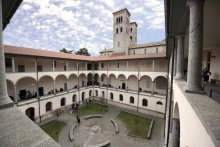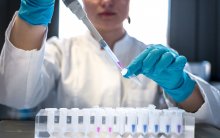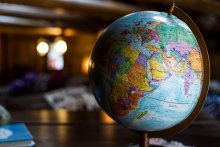Master’s degree courses
Free
2 years
Busto Arsizio - Molini Marzoli
Italian
Department of Biotechnologies and life sciences
Course description
Environmental sustainability is a central theme for the development of contemporary society, reaffirmed by inserting the protection of the environment, biodiversity, and ecosystems among the fundamental principles of the Italian Republic through the modification of Art. 9 of the Constitution.
Training in new occupational opportunities (green jobs) needs a high practical-operating capacity, anchored on a solid cultural heritage founded on biological principles in planning, application, and verification of environmental sustainability in all areas, including an effective ecological transition of productive processes, which can enhance natural capital and contribute to human well-being.
The course is characterized by a combination of biodiversity and environmental sciences, including biomolecular contents and methods. This training allows an integrated approach at all the different organization levels of biology (molecular, cellular, organism, species, and community). Biodiversity and environment sciences are dedicated to the knowledge of biological resources (natural capital), processes, and sustainability, while those of the biomolecular sector will provide advanced knowledge and techniques at the molecular and cellular levels. Disciplines of specialization are most present in the second year. Students will be able to acquire skills in the cellular-molecular field or insights into issues related to agroecosystems and sustainable production approaches.
Lessons are held in Italian, but candidates must have an internationally recognized certification for the English language at level B2 (or higher).
What you need to know
The Master’s Degree in Biology and Sustainability is an open-access program.
To apply, candidates must hold a Bachelor’s Degree (three-year) in Biotechnology (L-2) or in Biological Sciences (L-13) (as defined by D.M. 270/04 or in the equivalent classes 1 or 12 under D.M. 509/99).
Alternatively, candidates holding a different academic qualification—obtained in Italy or abroad and recognized as suitable under current regulations—may also apply. In such cases, admission is conditional upon having earned the following minimum number of university credits (CFU):
- At least 36 CFU in Area 05 – Biological Sciences, or in one or more of the following scientific-disciplinary sectors (SDS):
AGR/03 (General Arboriculture and Tree Crops)
AGR/04 (Horticulture and Floriculture)
AGR/05 (Forest Management and Silviculture)
AGR/06 (Wood Technology and Forest Utilization)
AGR/07 (Agricultural Genetics)
AGR/11 (General and Applied Entomology)
AGR/12 (Plant Pathology)
AGR/15 (Food Science and Technology)
AGR/16 (Agricultural Microbiology)
AGR/17 (General Animal Husbandry and Genetic Improvement)
AGR/18 (Animal Nutrition and Feeding)
AGR/19 (Special Animal Husbandry)
AGR/20 (Animal Breeding) - At least 12 CFU in Area 01 – Mathematical and Computer Sciences, Area 02 – Physical Sciences, or in the SDS MED/01 (Medical Statistics) under Area 06 – Medical Sciences;
- At least 12 CFU in Area 03 – Chemical Sciences, or in the SDS AGR/13 (Agricultural Chemistry) under Area 07 – Agricultural and Veterinary Sciences.
In order to be admitted to the program, candidates must demonstrate an adequate knowledge of the English language, corresponding to at least level B2 of the Common European Framework of Reference for Languages (CEFR).
Students must meet all curricular requirements before undergoing the personal preparation assessment.
Please note: no additional credits or learning obligations (debiti formativi) may be assigned within this Master’s Degree Program.
Graduates of the Master’s Degree in Biology and Sustainability possess a solid understanding of the scientific method and the ability to apply it effectively. They are trained to identify, understand, and critically assess stress conditions and the degradation of biological processes, as well as to apply techniques aimed at the sustainable use of biological resources and biodiversity.
Specifically, graduates in this field will develop:
- The ability to understand and investigate biological, adaptive, and evolutionary processes at various organizational levels (molecular, cellular, organismal, species, and community);
- The skills to design and implement strategies for conservation, sustainable use, and/or ecosystem restoration to preserve or re-establish the balance necessary for maintaining biodiversity;
- The competences to carry out both basic and applied research on biological topics related to environmental sustainability challenges.
Furthermore, thanks to their knowledge of quantitative approaches, including data acquisition and analysis techniques in biological research, BIOSOS graduates are well qualified to operate in innovative sectors and to serve as key players in supporting the ecological transition.
A graduate in Biology and Sustainability (BIOSOS) may:
- Coordinate and design management activities for park authorities, mountain communities, and other public bodies involved in the conservation and/or sustainable use of natural resources;
- Collaborate with non-profit organizations, cooperatives, start-ups, or enterprises that focus on biological resources with the aim of preserving natural capital;
- Coordinate multidisciplinary teams involved in the restoration of degraded ecosystems;
- Design and implement monitoring programs for the collection and analysis of bio-environmental data;
- Work with companies managing or utilizing natural systems, particularly in sustainability-oriented operations;
- Collaborate with businesses undergoing green transitions or seeking to improve the environmental sustainability of their processes and products as a competitive advantage;
- Assist organizations dealing with environmental issues, including ecosystem restoration and biodiversity conservation;
- Work as a freelance professional in the management and planning of biotic components of the environment;
- Join research laboratories in public institutions (such as universities or the National Research Council – CNR) or private companies with dedicated research and development departments.
If you are a EU National, you may stay in Italy for as long as you like: you only need a passport or ID card.
If you are a NON-EU National, you'll have to carry out some formalities.
At the University level, various Services are organized to complement and support your student life. To learn more, please consult the section: Infostudenti – Student Information Service.
Each Study Program appoints faculty tutors for each academic year. The tutors are responsible for liaising with students to identify any issues related to the delivery and organization of the study program. Additionally, at the beginning of the academic year, tutors, in collaboration with faculty members and administrative staff, organize a welcome meeting for first-year students to present the Study Program.
The purpose of the Tutoring service is to support students throughout their university journey, helping them overcome any difficulties encountered during their studies. The service offers guidance and assistance to newly enrolled and continuing students through various initiatives and activities promoted by the Study Program.
Faculty members, together with the administrative staff’s Academic Quality Managers (MDQ), also organize additional meetings throughout the academic course to support students’ learning path.
Tutors:
Department of Biotechnology and Life Sciences
Via J.H. Dunant 3, 21100 Varese - Italy
e-mail: didattica.dbsv@uninsubria.it
To view curricula and course programmes from previous Academic Years, you can proceed in two ways:
- click on one of the buttons above (e.g. 1st YEAR), then scroll up the page and, next to “Year of enrolment”, select your year of enrolment;
- alternatively, click on “Course data sheet” at the top of this page and, again, select the desired year from the menu next to “Year of enrolment”.
Opportunities and support
For information on scholarships and other benefits, consult:
Enrollment
Do you think that this course fits you? Enroll and start studying with us!
Attending classes
In the Academic Year 2025/2026, first-semester classes will begin on September 22, 2025. Second-semester classes will begin on February 23, 2026.
- All lectures will be held in person.
- Laboratory activities will also take place in person.
- To access lecture materials and promptly view announcements published by instructors, you must be enrolled in the relevant course on the university's e-learning platform.
If the course you are looking for does not appear in your personal catalog, you can find it in the general list and enroll manually.
Please note: If your enrollment process is not yet complete, you will not be able to access student services or systems.
Class schedules are available in the following ways:
- By accessing the Student Web Services or the Insubria App, if you are a student with a completed enrollment (you will be able to see the schedule for courses in your study plan).
Refer to the guide How to Find Your Class Schedule.
Alternatively, you can consult:
Once you open the link, you will see the current week. To view the upcoming weeks, use the arrows at the top right of the screen.
Please check the timetable frequently: any changes, including class cancellations or rescheduled sessions, are updated directly in the online calendar.
You may also be interested in:
Specific instructions and updates regarding university closures, holidays, and the academic calendar of the program are available at:
To attain the degree you must complete a stage or internship and produce a final report.
Find out more on DBSV Internship Office.
Studying, taking exams and graduating
To consult the teaching material:
- go to https://elearning.uninsubria.it/
- log in with your university credentials: email username and password (without typing the @studenti.uninsubria.it part)
- choose the courses of your study plan in the I miei corsi (My courses) section
- there you will find all the materials that the teacher makes available.
To consult the exam dates and times go to the Servizi Web Segreterie studenti (Student Secretariat Web Services)
https://uninsubria.esse3.cineca.it/ListaAppelliOfferta.do (in Italian)
In the Menu select one or more options:
- the day scheduled for the exam
- the teaching structure, i.e. your Department or your School
- the course of study, i.e. your degree course
- the teaching course, i.e. the title of the teaching
- the teacher.
To submit your examination entry, you must access your personal area of the Student Secretariat Web Services.
- Log in with your university credentials: email username and password (without typing the @studenti.uninsubria.it part)
- Esami > Appelli
Then, select the exam session you want to submit your entry for and proceed following the instructions.
• Consult the general University rules relating to the Degree application: Domanda di Laurea (in Italian)
• Submit the application respecting the administrative deadlines. See Conseguimento titolo on-line (in Italian)
• Register for the last internship registration session before the graduation session, respecting the instructions given in the session notes
• Check the dates of the graduation sessions and the rules for submitting the thesis on the page Graduation Exam - Biology and Sustainability
• The diploma (or parchment) is delivered during the graduation session.
Only for the possible collection of diplomas from before 2020 that are still in stock, consult Ritirare il diploma di laurea (in Italian)
Student services
For all resources, services and opportunities dedicated to registered students, see: Student.
Keep on with us!
Thinking About What’s Next After Graduation?
Take a look at the PhD Programs waiting for you at Uninsubria.





